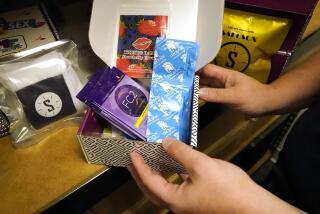Talking to Teens About Sex--It’s in the Details
- Share via
Last week’s column reported the results of the first national study to ask 14-to-19-year-old males about sexual activities other than vaginal intercourse.
Although 55% said they’d had vaginal sex, substantial numbers are engaging in noncoital sexual behaviors. Two-thirds reported having engaged in oral sex, heterosexual anal intercourse and/or masturbation by a female. Only 22% of teenagers reported using condoms during vaginal intercourse. Experts speculated that teen males are probably not using condoms for noncoital sex.
The study calls into question how well parents, sex education programs and public health experts are teaching teenagers about sex and its risks. Since 1996, Congress has given funds to states offering abstinence-only sex education--the “just say no” approach. For this reason, and because research indicates that parents hold the most powerful influence over their children, sex educators and public health experts agree that the first and best place to start educating kids about sex is at home.
“We know from studies that close relationships between parents and their children over many years reduces sexual risks,” said Sarah Brown, director of the Washington, D.C.,-based National Campaign to Prevent Teen Pregnancy (https://www.teenpregnancy.org). “Most of the polling research shows that parents say to their children, ‘Oh my God, don’t have vaginal sex, but if you do, use protection.’
“That conversation is not sufficient,” said Brown. “Parents need to talk about these different levels of intimacy and what they mean. Kids do want to know . . . They may be picking their split ends or have a baseball cap pulled over their face, but they are listening.”
Brown and others concede that just the thought of talking about oral sex and anal sex with their children makes most parents gag on their caffe lattes. And most teenagers would have to be administered oxygen if their parents announced, “Hey, let’s chat about oral sex before dinner.” This discomfort has led Dr. Mark Schuster, director of UCLA/Rand Center for Adolescent Health Promotion, to create a program to help both parents and teenagers get more comfortable. Schuster just completed a pilot study of the seven-week program, which teaches parents how to talk with their kids, especially about values and sexual behaviors. Because most parents work, classes were offered at work sites.
“We tell parents there is a wide variety of sexual activities that youth engage in, and that if a daughter says that she has never had sexual intercourse, that doesn’t mean she hasn’t had other sexual activities,” Schuster said.
Parents learn that they should discuss a wide range of sexual activity, and how to bring up the subject. They learn how to listen, how not to solve problems for their child and how, instead, to teach their child to think things through and make decisions.
A study of 600 more parents will begin this summer. (Businesses interested in joining the study can e-mail Schuster at center@rand.org).
Most psychologists and physicians agree that teenagers need explicit, accurate information about sexual behaviors and risks. But even then, it is often difficult to pierce teenagers’ feelings of invincibility. George E. Smith, a physician based in Philadelphia, thinks peer education is an effective approach. “Kids under my treatment for AIDS, genital warts, and pharyngeal gonorrhea have volunteered to meet with other kids to share what it is like to live with sexually transmitted diseases,” said Smith, author of “More Than Sex,” (Kensington; 2000) a book about the impact of stereotypes on black males. “I have shown youngsters slides of lesions for syphilis and genital warts. Afterward, I have had youngsters say, ‘Dr. Smith, I have seen this. My boyfriend told me it was a rash he got from playing basketball.’ You cannot assume they know anything.”
Last, adults must not make the mistake of withdrawing when teenagers radiate the message: You don’t matter anymore. “The goal here is an ongoing conversation about sexual intimacy and what our family believes about it,” said Dr. Michael Resnick, director of the National Teen Pregnancy Prevention Center at the University of Minnesota. “You have to be explicit, even if you have to practice it in the mirror.”






